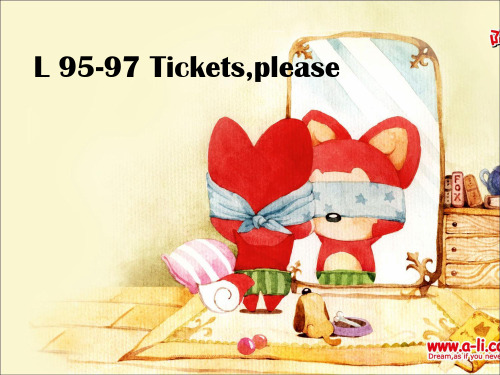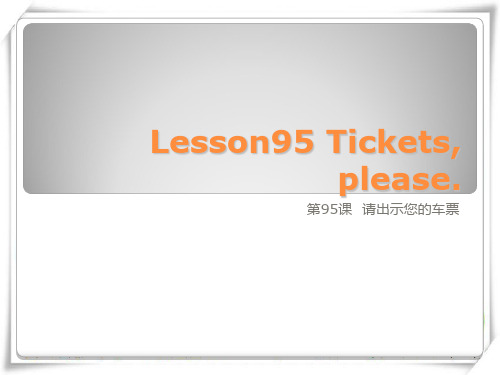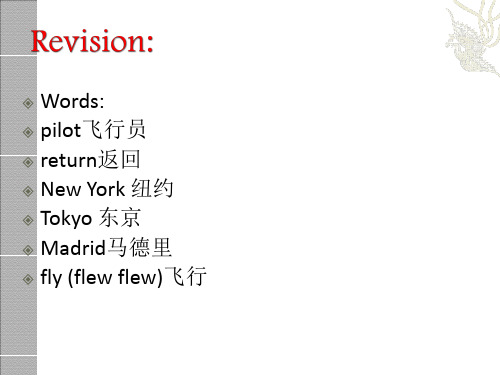新概念英语第一册95-96课课件45593知识分享
合集下载
lesson 95-96 新概念一册教师用课件全(吐血制作)

在…前(过去时)
表示in
位’s 2. num.+ 时间
time
单位复数’
…后(将来时)
Written exercise
B
一般过去时转一般将来时
• Lecture paper
Sb.+had better +do+sth.
•最好做某事. had better 可视为一个情态动词.翻 译为’最好’表建议,劝 告,命令等.比must 口气 柔和.
你最好现在就来.
• You had better come now. • You’d better come now.
否定: 你最好现在不要来.
•You’d better not come now.
Watch the flash
Lesson 96
Written exercise A
• must 句子转为 had better句子
一般过去时 与
一般将来时 时间短语
表示过去的时间短语
•a+ 时间单位
•num.+ 时间单位 ago
(复数)
Lesson 95-96
Lesson 95
Tickets,please
WORDS
return train •n.往返 n.火车
•V.返回
•一张往返车 票a~
porter
catch
• n. 收票员 • vt.赶上
•他们的爸爸 •(caught)
当了30年的 收票员了。
• miss vt. 错过;
• Has been 想念
a porter
•for 30
next door to… •与…相邻; •车站隔壁有个酒吧.
表示in
位’s 2. num.+ 时间
time
单位复数’
…后(将来时)
Written exercise
B
一般过去时转一般将来时
• Lecture paper
Sb.+had better +do+sth.
•最好做某事. had better 可视为一个情态动词.翻 译为’最好’表建议,劝 告,命令等.比must 口气 柔和.
你最好现在就来.
• You had better come now. • You’d better come now.
否定: 你最好现在不要来.
•You’d better not come now.
Watch the flash
Lesson 96
Written exercise A
• must 句子转为 had better句子
一般过去时 与
一般将来时 时间短语
表示过去的时间短语
•a+ 时间单位
•num.+ 时间单位 ago
(复数)
Lesson 95-96
Lesson 95
Tickets,please
WORDS
return train •n.往返 n.火车
•V.返回
•一张往返车 票a~
porter
catch
• n. 收票员 • vt.赶上
•他们的爸爸 •(caught)
当了30年的 收票员了。
• miss vt. 错过;
• Has been 想念
a porter
•for 30
next door to… •与…相邻; •车站隔壁有个酒吧.
新概念英语NCE_Lesson95-96(共14页)课件

• miss (v.)错过,遗失,想念
I nearly missed my flight. He missed the pen from the desk. Her children have gone to Australia, and she missed
them very much.
• in five hours’ time 五小时之后
则表示共有 例如:John’s and Mary’s room
John and Mary’s room (4)复数名词和短语, John’s and Mary’s room加在最后一个
词的词尾 例如:a month or two’s leave
Grammar
• 一般过去时
did/ v-ed 动词过去式 He didn’t want to leave.
L 95-97 Tickets,please
New words and expressions
• return (v.)往返,归还
前缀re有“再,又;重新”的意思 I’ll return at 10 this evening. When will you return the book I lent you? return ticket 往返票 one-way ticket 单程票
groggery<美古> 酒店, 酒吧 public house简称pub酒馆,客栈 saloon酒吧间 taproom酒吧
• It’s only three minutes to eight.
4:15 four fifteen或a quarter past four 8:45 eight forty- five或 a quarter to nine 9:00 nine o’clock 或 at nine 11:55 eleven fifty-five 或five to twelf 1:10 one ten或 ten past one 1:15 one fifteen 或a quarter past one 1:30 one thirty 或 half past one 1:50 one fifty或 ten to two
I nearly missed my flight. He missed the pen from the desk. Her children have gone to Australia, and she missed
them very much.
• in five hours’ time 五小时之后
则表示共有 例如:John’s and Mary’s room
John and Mary’s room (4)复数名词和短语, John’s and Mary’s room加在最后一个
词的词尾 例如:a month or two’s leave
Grammar
• 一般过去时
did/ v-ed 动词过去式 He didn’t want to leave.
L 95-97 Tickets,please
New words and expressions
• return (v.)往返,归还
前缀re有“再,又;重新”的意思 I’ll return at 10 this evening. When will you return the book I lent you? return ticket 往返票 one-way ticket 单程票
groggery<美古> 酒店, 酒吧 public house简称pub酒馆,客栈 saloon酒吧间 taproom酒吧
• It’s only three minutes to eight.
4:15 four fifteen或a quarter past four 8:45 eight forty- five或 a quarter to nine 9:00 nine o’clock 或 at nine 11:55 eleven fifty-five 或five to twelf 1:10 one ten或 ten past one 1:15 one fifteen 或a quarter past one 1:30 one thirty 或 half past one 1:50 one fifty或 ten to two
新概念英语NCE_Lesson95-96课件

冯千禧五年级下第5次学习记录
You made my day!
数阅
学读
使使ቤተ መጻሕፍቲ ባይዱ
人人
精充
细实
;;
博会
物谈
使使
人人
深敏
沉捷
;;
伦 理 使 人 庄 重 ; 逻 辑 与 修 辞 使 人 善 辩 。
写 作 与 笔 记 使 人 精 确 ; 史 鉴 使 人 明 智 ; 诗
歌
使
人
巧
慧
;
我们,还在路上……
翻译以上短文
昨天我和妈妈去菜市场买菜,我们想要买些肉和 水果蔬菜,妈妈常常在同一家肉店买肉,我们买 了一些鸡肉,妈妈问店主:“请问你这里有牛排 肉吗?我想要一些。”店主说“今天没有牛排肉 了,但是有上好的猪肉,您想来点吗?”妈妈说: “不用了,谢谢。你这还有别的什么吗?”店主 说:“还有些鸭肉,您想要吗?”妈妈说:“我 们不是很喜欢吃鸭肉,谢谢。”后来我们买了些 土豆、番茄和豆腐,又买了些香蕉和苹果,就回 家了。
时间之后)
Pay more attention
When did… When will… 一般过去时和一般将来时的区别 When did they fly to Guangzhou? They flew there three days ago. When will they return to Chengdu? They’ll return in four days’ time.
口语表达 作文
其他需要注意
2011年3月12日 完成不错 认真 很好,有了明显进步,可以从整体上把握句子结构。 相比以前进步很大,目前为止还没有特别大的进展。 注意重读音节和句子的停顿。 目前没有太大问题。个别长句注意一下语序。 表情有点僵硬,建议要结合所讲内容适度地表情,微 笑、难过等等。 较好。 很不错,没有语病,只是太短了。 多听多读多练,多复习。
概念英语第一册95-96课课件-英语教学

05
缺点
06
游戏化教学有时可能会过于注重游戏本身而忽略了学习 的本质,因此需要教师合理把握游戏与学习的平衡。
04 Course evaluation and feedback
Classroom performance evaluation
01
02
03
评价标准
评估学生在课堂上的表现, 包括口语表达、听力理解、 阅读理解和写作能力。
03
Long Sentences: Long sentences can be difficult to follow because they often have many clauses and subclauses, making it difficult to keep track of the relationships between ideas.
01 Course Introduction
Teaching objectives
Language skills development
To enhance students' ability to read, write, speak and listen in English.
Cultural understanding
Infinitive Phrases: Infinitive phrases are made up of the infinitive form of a verb (to + verb) and can be used as nouns or adjectives. They are often used in place of finite clauses for greater conciseness.
缺点
06
游戏化教学有时可能会过于注重游戏本身而忽略了学习 的本质,因此需要教师合理把握游戏与学习的平衡。
04 Course evaluation and feedback
Classroom performance evaluation
01
02
03
评价标准
评估学生在课堂上的表现, 包括口语表达、听力理解、 阅读理解和写作能力。
03
Long Sentences: Long sentences can be difficult to follow because they often have many clauses and subclauses, making it difficult to keep track of the relationships between ideas.
01 Course Introduction
Teaching objectives
Language skills development
To enhance students' ability to read, write, speak and listen in English.
Cultural understanding
Infinitive Phrases: Infinitive phrases are made up of the infinitive form of a verb (to + verb) and can be used as nouns or adjectives. They are often used in place of finite clauses for greater conciseness.
新概念英语一册95--96课课件

Have you ever been somewhere by train? Did you have a good journey? Have you ever missed the train?
Listen to the tape then answer these questions.
plenty/plenti/大量 Plenty of 许多,大量 我有很多的时间。 I have plenty of time.
bar/ba:/酒吧 在那边有一个酒吧。 There is a bar over there.
station/steiʃən/火车站,车站 bus station 公共汽车站 他现在在公共汽车站呢。 He is at the bus station.
你最好不要告诉他。
You had better not tell him. 我们最好不要离开。
We had better not leave.
We must go back to the station now.
我们必须现在就回车站。
2. must do sth 必须做某事 语气比had better 强烈,没有 人称和数的变化。
GEORGE: Two return
n. 往返 v.归还 返回(~ to) Please return the book in time.
tickets to London, please.
to 表示所有关系 a ticket to London一张到伦敦的车票 a train to London去伦敦的火车 the way to London到伦敦的路
GEORGE: It's only three minutes to eight. KEN: Let's go and have a drink. There's a bar next door to the station.
新概念英语第一册95-96课件(共63张PPT)

• 4. What time is it? 现在几点了? • 5. in five hours’ time 5小时之后
What’s the time? It is …
1. 直读法:
8:56 eight, fifty-six 12:34 twelve, thirty-four 10:08 ten, eight
• 2)(政府机关等的)局,所,中心 • a police station 警察局 • a fire station 消防队 • a gas station 加油站 • a TV station电视台
platform n.站台
★ platform
• 1) n. 站台,月台 • Buy a platform ticket ,please. • platform No.2 = platform 2 第二站台 • I’m waiting for you at platform 5. • 我正在第5站台等你呢。 • 2)n.讲台,讲坛 • The teacher is standing on the platform and
PORTER : Tickets, please.
GEORGE : We want to catch the eight nineteen to London.
What’s the time? It is …
2. 加减法:
What time is it? It is …
time
• a minute ago • two minutes ago • an hour ago • two hours ago • a day ago • a week ago • a month ago • a year ago
• 1.What time will the train leave? • At nineteen minutes past eight. • 2.Which platform and what time will the
What’s the time? It is …
1. 直读法:
8:56 eight, fifty-six 12:34 twelve, thirty-four 10:08 ten, eight
• 2)(政府机关等的)局,所,中心 • a police station 警察局 • a fire station 消防队 • a gas station 加油站 • a TV station电视台
platform n.站台
★ platform
• 1) n. 站台,月台 • Buy a platform ticket ,please. • platform No.2 = platform 2 第二站台 • I’m waiting for you at platform 5. • 我正在第5站台等你呢。 • 2)n.讲台,讲坛 • The teacher is standing on the platform and
PORTER : Tickets, please.
GEORGE : We want to catch the eight nineteen to London.
What’s the time? It is …
2. 加减法:
What time is it? It is …
time
• a minute ago • two minutes ago • an hour ago • two hours ago • a day ago • a week ago • a month ago • a year ago
• 1.What time will the train leave? • At nineteen minutes past eight. • 2.Which platform and what time will the
新概念英语第一册95-96课(课堂PPT)

6. Mother ________ me a nice present on my next birthday.
A. will gives B. will give C. gives D. give
6
7. Who _____D___ we ________ swimming with tomorrow afternoon? A. will; go B. do; go C. will; going D. shall; go
1.Students will go to school in the future.(一般疑问 句)W_i_ll s_tu_dents _g_o to school in the future. 2.There will be some robots in our homes.(改为否 定句)Therew_on_`t b_e _a_ny_ robots in our homes. 3.Everyone will have a small car.(对划线部分提问) W_h_at_w_ill everyone _ha_ve?
• I caught five fish today.
• 我今天钓了五条鱼
• 2)v. 及时赶上,赶得上,追上
• I ran to catch the last bus.
• 我跑着赶上了最后一班车。
•
• 3)v.染上(疾病),感染
• I caught a bad cold.
• 我得了重感冒。
17
miss
I will not lend the book to you. 3.用be doing表示将来:主要意义是表示按计划、
安排即将发生的动作,常用于位置转移的动词。 如:go,come,leave,arrive等动词。 检测:明天我们将搬到一个新的旅馆。
A. will gives B. will give C. gives D. give
6
7. Who _____D___ we ________ swimming with tomorrow afternoon? A. will; go B. do; go C. will; going D. shall; go
1.Students will go to school in the future.(一般疑问 句)W_i_ll s_tu_dents _g_o to school in the future. 2.There will be some robots in our homes.(改为否 定句)Therew_on_`t b_e _a_ny_ robots in our homes. 3.Everyone will have a small car.(对划线部分提问) W_h_at_w_ill everyone _ha_ve?
• I caught five fish today.
• 我今天钓了五条鱼
• 2)v. 及时赶上,赶得上,追上
• I ran to catch the last bus.
• 我跑着赶上了最后一班车。
•
• 3)v.染上(疾病),感染
• I caught a bad cold.
• 我得了重感冒。
17
miss
I will not lend the book to you. 3.用be doing表示将来:主要意义是表示按计划、
安排即将发生的动作,常用于位置转移的动词。 如:go,come,leave,arrive等动词。 检测:明天我们将搬到一个新的旅馆。
新概念一95-96课课件(完整版)

n. 收票员
• catch(caught, caught) [kætʃ] v. 赶上
• miss
[mis]
v.错过
根据句意和首字母写出单词 1.I got up late, so I couldn't c the bus. 2.She m the early bus, so she was late for school again. 3.They are waiting for the train at the train s . 4.These men are drinking wine in a b . 5.There are p of flowers inthe garden.
93.Tickets,please. 请把车票拿出来。
Review words
• 1.pilot ['pailət] n.飞行员 • 2. return [ri'tə:n] v.返回 • 3. New York ['nju: 'jɔ:k] n.纽约 • 4. Tokyo ['təukjəu] n.东京 • 5. Madrid [mə'drid] n.马德里 • 6. fly [flai] v.飞行
注
一般过去过的几种基本句型(非be动词) 意
做
1.) 肯定句:主语+过去式+其它
如:He telephoned me four times yesterday.
笔 记 哦!
2.) 否定句:主语+didn’t+动词原形+其它
如: He didn’t telephone me four times yesterday.
• miss
- 1、下载文档前请自行甄别文档内容的完整性,平台不提供额外的编辑、内容补充、找答案等附加服务。
- 2、"仅部分预览"的文档,不可在线预览部分如存在完整性等问题,可反馈申请退款(可完整预览的文档不适用该条件!)。
- 3、如文档侵犯您的权益,请联系客服反馈,我们会尽快为您处理(人工客服工作时间:9:00-18:30)。
n. 站台 n. 大量 n. 火车 n. 车站,火车站 n. 酒吧 v. 赶上 n. 往返 v. 错过 n. 收票员,乘务员
Lesson 95 Tickets, please.
Read the text again then answer the questions :
1.What time will the next train leave? 2.Which platform can they wait for the train? 3.Did they miss the train?Why? 4.Is that clock slow or quick?
• You sent me a postcard, in return, I sent you a postcard too.
• v. 3)回到
•
return from…to…
•
从…回到…
•
return sth to sb = return sb sth
•
把…归还某人
•
return to sp 回到某地
• There is plenty of milk in my cup. • 教室里有好多学生。
• There are plenty of students in the classroom. • plenty of • a lot of/ lots of 即可接可数名词和不可数名词。 • many 许多,修饰可数名词, • much 许多,修饰不可数名词。
• You should train your children how to respect others.
• trainer['treɪnə] n. 助理教练;训练员
platform
• 1) n. 站台,月台 • 到站站台
• an arrival platform • 第二站台
• platform No.2 = platform 2 • 我正在第5站台等你呢。 • I’m waiting for you at platform 5. • 2)n.讲台,讲坛 • 老师站在讲台上看着学生们。
Lesson 95
Tickets, please.
Questions:
1.Why did George and Ken miss the train?
• return • train • platform • plenty • bar • station • porter • catch(caught, caught ) • miss
• When the teacher called the name list, he missed me out.
• return • train • platform • plenty • bar • station • porter • catch(caught, caught) • miss
• train
• 1) n. 火车 • 乘火车去… • take the train to … • 我们要搭下午2点的火车去北京。 • We’ll take the 2:00 p.m. train to Beijing. • 2)v. 训练,培养 • 他为了比赛在训练那匹马。
• He is training the horse for the race. • 你应该教导你的孩子如何尊重别人。
station n.
• 1) 车站,火车站 • 火车站
• a railway station • 公共汽车站
• a bus station = a bus stop • 你能告诉我往车站怎么走吗?
• Could you tell me the way to the station? • 2)(政府机关等的)局,所,中心
• I caught five fish today. • 2)v. 及时赶上,赶得上,追上 • 我跑着赶上了最后一班车。
• I ran to catch the last bus. • 3)v.染上(疾病),感染 • 我得了重感冒。
• I caught a bad cold.
1)catch up with 追上;赶上
• 警察局 a police station • 消防队 a fire station • 加油站 a gas station • 电视台 a TV station
catch
• 1) v. 捕捉,逮捕 • 在公共汽车上我们抓住一个小偷。
• We caught a thief on the bus today. • 我今天钓了五条鱼
n. 往返 n. 火车 n. 站台 n. 大量 n. 酒吧 n. 车站,火车站 n.收票员,乘务员 v. 赶上 v. 错过
• return n.
• 1) 往返
• return ticket 往返票 • return ticket to 到…的往返票 • 2) in return • 作为回报
• 你给我寄来一张明信片,我也回寄一张明信片。
• The teacher is standing on the platform and looking at the students.
plenty
• 1)n. 大量 • plenty of +可数名词复数或不可数名词,通常用于肯
定句。
• 谓语动词的单复数形式须与其修饰的名词一致。 • 我杯里有许多牛奶。
2)catch one’s eyes 引起某人注意力
miss
• 1) v. 错过 • 他没打中目标。
• He missed the target. • 我把球丢给他,但他没接着。
• I threw the ball to him but he missed it. • 2)v. 想念 • 如果你去国外,我们会很想念你。 • We’ll miss you very much if you go abroad. • 3)miss out • 漏掉,省 略,遗漏 • 老师点名的时候,漏掉了我。
• 表示许多的短语有哪些? • 修饰可数名词有:a good /great many of,
a good /great number of, scores of • 修饰不可数名词有:a large amount of • 既可修饰可数名词又可修饰不可数名词有: • a lot of, lots of, plenty of
